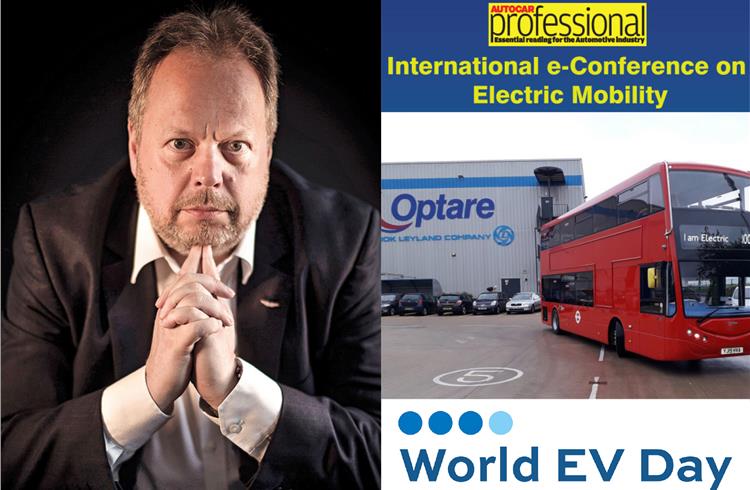Andrew Palmer: ‘Adopt a Darwinism approach for EVs’
Palmer believes that, we should not legislate EVs but adopt a Darwinism approach and enjoy the best of all.
“The global automotive industry is going through a flux of changes and it is challenged by various factors. A series of external factors lead the foreseeing change and EV is one among them. It is hard to put these in a particular order and the most profound one is the changing customer experience. The auto industry is going to take the zero-emission route. The move will be inevitable, and EV is going to be more disruptive than any other event in auto industry,” said Dr Andrew Palmer, Chairman, Optare Plc while delivering his perspective as guest of honour at Autocar Professional’s first ever international e-Conference on Electric Mobility – Scaling up in the Midst of Challenges to mark World EV Day on September 9.
According to Dr Palmer, one of the most obvious issues for the auto industry is tackling expectations of Gen Z. They look at cars as an appliance. Around 70 percent of them do not hold a valid driving license and 30 percent does not expect to get one. They are more interested in virtual reality and smart homes than vehicles, says a survey. But, they also see autonomous as an eventual reality at some point in the near future. Also, around 60 percent of them are expected to use these by 2029.
What the Gen-Z wants?
“The implication of these insights are far-reaching. The industry needs to rethink how to excite the Gen z customers and those who come next. Automakers need to replace attributes like horsepower, towing capacity, fuel economy with new features like product experience and more. For example, in Madrid, around 5000 E-scooters were deployed on-demand as a means to cut pollution, noise and traffic. Young Spaniards flock to this and it had a good response. It has grown fivefold over the past 12 months,” the Optare chairman pointed out.
He mentioned, "Customer dynamics is changing. Also, technology, environmental considerations are all imposing change and the new generation is leading the change more towards the EV. This combined with growing demand, legalisation, technology push has made EV a single significant disruptive change since the horses gave way to cars.”
The inevitable
Keeping all these in mind, the move towards EV, a cleaner and reduced human impact environment have proved to be inevitable. Also, the route to EV is expected to be more disruptive than any other event in the auto industry.
That said, Palmer believes that, “We should not legislate EVs but adopt a Darwinism approach and enjoy the best of all. EV allows for easier entry digital disruptions that are led by technology companies. The barriers are now lower and hence we see a significant rise in battery manufacturers in China and the US. The primary sale of EV sales is positive. But, as of 2019 only 2.5% of vehicles run on electricity. This proves us that we have a long road ahead,” Palmer states.
With the long road ahead, he also feels that this may create quite a disturbance and evolution in the auto industry. While autonomous will also take a leap in major cities, he expects cities like Frankfurt, Singapore to have shared autonomous pods by 2030. He also mentioned the level 4 of autonomous is very much possible in the near future.
“The battery technology will evolve quickly through various derivatives of Lithium-ion etc and reach the solid-state by 2030. The ideas on fuel cells are less clear now. In reality, the transformation to EV requires huge investment too. The change is starting to gain real momentum. In 2019, there were 2.26 million units of light electric vehicles globally. This is nine percent higher than in 2018. In public transport, the forecast indicates approximately 40 percent of new city buses in Europe will be BEV by 2025. Countries like Netherlands are the quickest and China is far ahead than the rest. We expect the buses to go 100 percent electric in cities in the near future. The Chinese have a home market advantage and they have the scale,” he said.
Speaking about various segments, Palmer pointed out that, “Many companies cannot afford the change and it has started to happen. It is going to force the industry to pace the change. There is a revolution in the two-wheeler market as the last mile connectivity is a huge winner. By 2030, mainly the scooter segments are expected to grow much quicker. CV business is also going to change as fuel cells are making an impact. In urban areas buses are going to be a perfect fit.”
Scope for collaboration
Given the dynamic role of electric buses and shared mobility dynamics, Palmer also hinted on scope of collaboration between Ashok Leyland and Optare, “See scope of closer collaboration between Optare Group and Ashok Leyland for electric buses in time to come.” Recently in their AGM, leading commercial vehicle manufacturer Ashok Leyland revealed it has ambitious plans for the electric vehicle (EV) segment in the short to medium term. This will see a wide range of developments in the EV for both passenger and LCV.
RELATED ARTICLES
Bosch hydrogen engine tech-powered truck to be on Indian roads this year
The global supplier of technology and services is betting big on both electromobility and hydrogen. While announcing the...
IIT Bombay inaugurates Arun Firodia Research Floor
IIT Bombay, one of India’s top technical and research institutions, honours Kinetic Group chairman Dr Arun Firodia, one ...
Maruti Suzuki expands capacity at Manesar plant by additional 100,000 units
New assembly line at Plant A expands total manufacturing capacity at the Manesar plants to 900,000 units per annum. Alon...





 09 Sep 2020
09 Sep 2020
 5418 Views
5418 Views





 Autocar Pro News Desk
Autocar Pro News Desk




